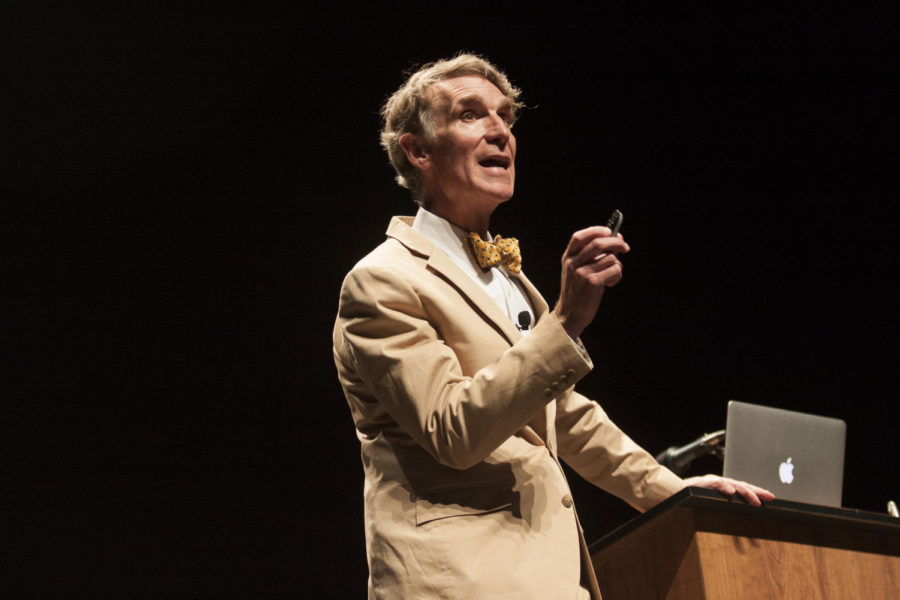Glawe: Climate change requires no debate
Photo: Megan Wolff/Iowa State Da
Bill Nye gives a speech at Stephens Auditorium on Sept. 21, 2012 as the kickoff event for Engineer’s Week. The speech, titled “You Can Change the World,” told of how scientists and the average person can make a positive change in the world.
May 29, 2014
I was once given the opportunity to meet Bill Nye “The Science Guy.” By meet, I mean to say that I actually had a conversation with the man. I was a lowly intern on The Hill in Washington D.C., clamoring for the chance to rub shoulders with the elites. My supervisor informed me that Nye graced Congress with his presence, and that if I hurried, I still might be able to catch a glimpse of my hero. I sprinted down the polished marble hall toward the committee room where he had recently given a lecture on education. I turned the corner, and there he was. He was speaking with a colleague, a conversation which I did not wish to interrupt. I intended only to take a quick picture of him. A lady, whose shiny lanyard hinted at officialdom, approached me and asked if I wished to meet my hero. I did, and so I was introduced.
We briefly conversed about the story of Michael Faraday and his discovery of electromagnetism. The content of the conversation isn’t what mattered, it was the content of his character that did. One thing I remember was Nye’s composure. He never seemed to talk down to me — as many rockstars do. He instead treated me as an equal. At one point, after I had revealed my status as a lowly intern, he quickly countered, “The lowly intern who’s going to change the world, right?”
Many of Nye’s public appearances reveal the same humility. Indeed, his crusade against climate change deniers and believers in Young Earth Creationism shows a man who is willing to abandon the innocence of childhood education and rise in defense of science. The opposition is often cringeworthy and infuriating, but Nye always keeps his composure.
John Oliver perhaps explained the dichotomy of the climate change debate best when he said, “More often than not, it’s Bill Nye the Science Guy versus some dude.” The climate change debate has thrust Nye to the forefront of public discourse. The problem, however, is that Nye is too nice, too understanding and too respectful. As Nye once said, “What [people] have done is used the word ‘science’ in this new way.” He then added that they “take scientific uncertainty … and turn it into doubt about the whole thing.” Disrespect of the scientific method deserves disrespect. It deserves no kindness. Folly must be stamped out, however cruel the means may be. Clearly, simply educating people is no longer enough.
I desire a skilled debater who is fluent in climatology and can hammer down the argument with precision. The arguments of the opposition should not be moderated but rather completely destroyed. By that means, we can rebuild society’s understanding of science. But for now, Nye will suffice.
The root of scientific denial is freshened by the media. John Oliver rightly points out that the major media outlets, in the spirit of public discourse, must have a 50-50 debate on climate change. That’s a misrepresentation — the debate is far from 50-50. Nevertheless, the “debate” — however fabricated it is — exists, and there is a growing demand for both scientists and those skeptical of climate change.
The danger of science becoming political is that it falls victim to public opinion. The nonscientific community should never have the authority to select the truths that best comfort it. The truths revealed by the scientific process are not up for debate. The use of science, however, is up for debate — such as the use of the atomic bomb. That is an important distinction not many people recognize.
Nye once said, “I have no trouble taking these political stances because I think the evidence is overwhelming.” Therein lies the problem: science is not inherently “political.” None of the debates he takes part in are actually debates at all. The scientific community holds itself accountable, and by that process, it proves itself to the public. Alas, that is the portrait of an ideal world.
By allowing science to be discussed by interest-driven and non-scientific demagogues, we lose our sense of what is true in the world — or at least the device by which we can decide what is true and what is not. Instead, truth is spun to fit popular narratives and political interests. For instance, conservative commentator Sarah Elizabeth Cupp once thrust upon Nye the notion that scientists are “bullies” and that the reports on climate change are mere “scare tactics.” However, science itself is oppressed by reality — it is in no position to bully. That shows how much of the discussion has been eroded away. Scientists are now perceived as “bullies” when they report facts. Those who side with Cupp think that scientists are deceiving everyone or that there is some devious twist behind their claims. Nothing could be further from the truth.
George Orwell once wrote, “Political language … is designed to make lies sound truthful and murder respectable, and to give an appearance of solidity to pure wind.” Those vehemently denying the labors of scientific inquiry are pure wind. Nye and his kind will do well to remember that.







